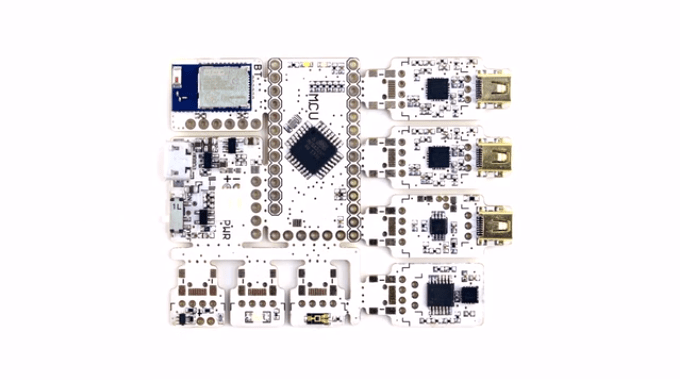Developers wanting to build apps that monitor and respond to human bio-signals should point their eyes at this Kickstarter project. BITalino (r)evolution is the follow up to last year’s modular kit of bio-signal sensors from the same Portuguese team — but with a lower price-tag, improved electronics, smaller sensor blocks and individual sensors broken out on their own so developers don’t need to purchase the whole kit to power a project.
More than 1,200 of the original BITalino kits were shipped in just over a year on sale, according to Hugo Silva, who steers the not-for-profit community building project. v1 kits were bought by academic institutions including MIT and large scale electronics companies such as Samsung, for prototyping purposes, along with individual makers, engineers, students and artists.
One art project powered by BITalino is this wonderfully ‘David Lynchian’ biofeedback room that responds to the ECG activity of the person within it:
Other projects have targeted medical use-cases, such as powering a muscle control interface so that people with ALS can control a computer using their facial muscles.
“We have redesigned all the electronics of the sensors to provide BLE, professional-grade cables, higher quality signals and more robust operation. Everything now has an incredibly smaller form factor; the board is smaller than a credit card (50% smaller than the initial version), and the sensors are as much as 66% smaller as well,” says Silva, discussing the changes made in the next-gen kit.
“Another huge difference is the price and availability… while the previous version was retailing for close to $200, with the campaign our goal is to release kits for $99 and less. Also, while before BITalino was only available as a kit, in this new version we’ll be able to make each block available as individual components.”
This time around the original BITalino sensor mix of Electrocardiography (ECG), Electromyography (EMG), Electrodermal Activity (EDA), Accelerometry (ACC), and Ambient Light (LUX) is being packaged into smaller application specific blocks for more targeted use-cases — including HeartBIT, which contains 1x ECG + 1x Blood Volume Pulse (BVP); MuscleBIT (1x EMG + 1x ACC); ArousalBIT (1x EDA + 1x BVP), MotionBIT (1x ACC + 1x MAG), BrainBIT (2x Electroencephalography (EEG)), FlowerBIT (1x LUX + 1x Skin Temperature (TMP) + 1x IMP).
Sensors can also be broken out individually. The idea being that a developer may not want to shell out for all the kit in the fully fledged BITalino, so can just pick and choose the sensors that make most sense to them. Individual sensors start at $39 on Kickstarter, or pledges start at $79 for a sensor block such as the HeartBIT.
Silva said the reason for taking a crowdfunding route with the follow up to the original BITalino is to get the price even lower by being able to bulk purchase components. It’s looking to raise $50,000 via Kickstarter to fund the device.
“We’re also seeking to include Bluetooth Low Energy, and accessories for storage on a memory card, and if we reach our stretch goal we’ll be able to create a version of BITalino on Printoo’s flexible PCB technology (huge advantage for self-tracking wearables),” Silva adds.
“We’re also building up a set of compelling software that people less proficient on embedded systems and programming can benefit from… one use case that we’re targeting are people with ALS… another case are teaching materials for young students.”
BITalino is one of several sensor kit projects that are seeking to accelerate development of the Internet of Things by making it easier for developers to prototype connected objects. Others in the space include relayr’s Wunderbar and the SAM wireless blocks project that recently got funded on Kickstarter.
At the time of writing BITalino has pulled in just under $9,000 with another 35 days left on the campaign.
